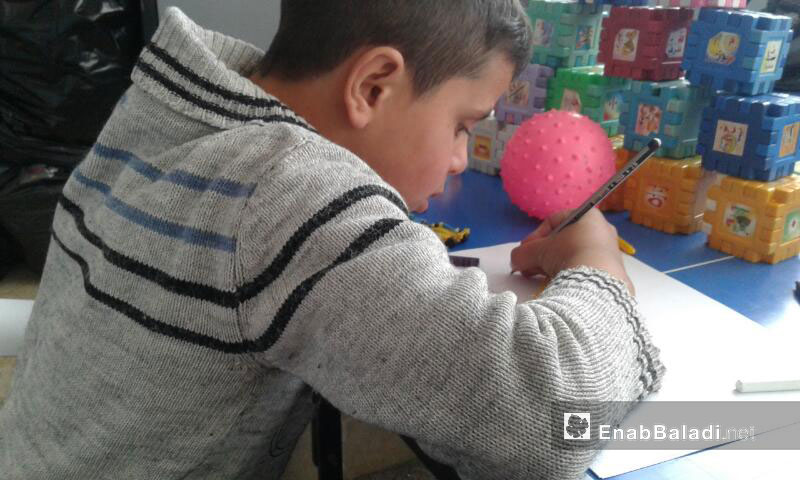Enab Baladi – Daraa
Inside small rooms, the child turns his eyes on his toys, watching some of his peers busy with things they used to deal with every day. The toys have become the basis of their lives over the past months, in an attempt to face the disease that has confused doctors and specialists for ago.
Despite his slow movement and lack of attention, Riyad shows a “clear” response that improved his actions and reactions, according to his mother. He took advantage of the Center for the Treatment of People with Autism, run by the NAMAA organization in the city of Nawa, in the western countryside of Daraa.
The family of Riyad, 8 years old, was unable to deal with him until it was registered in the center of NAMAA. He received a program from its administration to deal with the child at home, as a form of support that the Center provides for some children who suffer from the disease, according to a statement by Riyad mother to Enab Baladi.
“They treat my child very well and I have noticed a clear improvement in his behavior with his brothers since he joined the center a year ago,” says Om Riyad. She points out also that the members of staff “work within limited possibilities but with a clear effort to deal with children.”
The child becomes autistic when affected by abnormal developmental disorders and he may be delayed in speech. While doctors observe strange behaviors related to social alienation, repetitive behavior and other symptoms, the cause of the disease is not specified yet and no treatment is available up to this date.
A Year of Work
There are no statistics concerning the number of children with autism in the western countryside of Daraa, but the abilities of the center made it able to receive eight cases (7 males and one female). They are treated by specialists, since the beginning of the work in the center in April of the last year, according to the supervisor, Nariman Jahmani.
The Center’s members of staff evaluate the cases based on medical reports, which are recognized by doctors as autism, as well as an assessment of the children’s behavior, based on the fifth edition of the Diagnostic and Statistical Manual of Mental Disorders “DSM-5”.
Jahmani speaks of a lack of communication and information exchange that children suffer from, “not to mention difficulties in the rules of conversation, the lack of knowledge about the use of verbal and nonverbal signals to understand the world, and the weakness in the ability to cope with the other.”
in an interview with Enab Baladi, the Center’s supervisor says: “the repetitive behavior such as beating the face, biting the hand, hyperactivity, screaming, and excessive activity in repetitive behavior are gradually reduced. She explains also that the dealing with each child “takes place following a special program, on a case-by-case basis, drawing on the children’s parents observations about their behavior and comparing them to medical reports.”
Activities that Contributed to a Gradual Improvement:
While collecting balls is one of the activities of the center that aims to improve movement and cooperation, the activity of sorting the cubes by color and shape aims to increase cognition, to improve the cognitive aspect and move the muscles of the fingers, and the staff members use colored tweezers.
The Humanitarian Organization NAMAA works in various fields, including education, psychological support and women’s empowerment, and currently runs a risk awareness section, including lectures on mines cluster bombs dangers, in cooperation with various bodies, such as the Civil Defense in Daraa.
Children are subject to balancing and moving from low to high exercises. The supervisor describes them as “necessary and that they help the child to communicate visually and increase his social interaction.” She notes that most children “started using their own intelligence, and the home-based exercises helped in this.”
The Center is in contact with a specialist doctor outside Syria with the aim of training its staff online, according to the General Supervisor of “NAMAA” organization, Samer Khebi. He says in an interview with Enab Baladi that the center can accommodate 50 children, stressing that “we seek to receive other cases that alleviate the suffering of children and their families as much as possible.”

